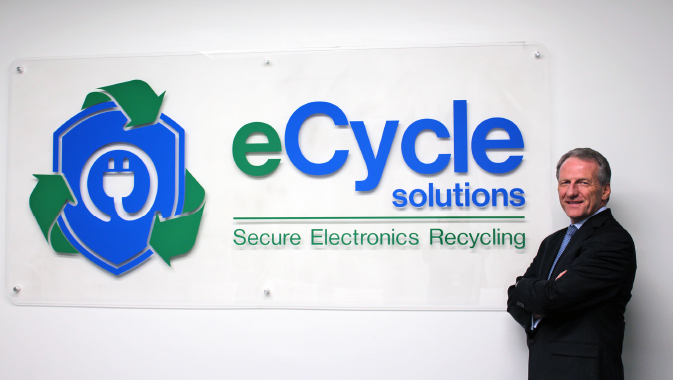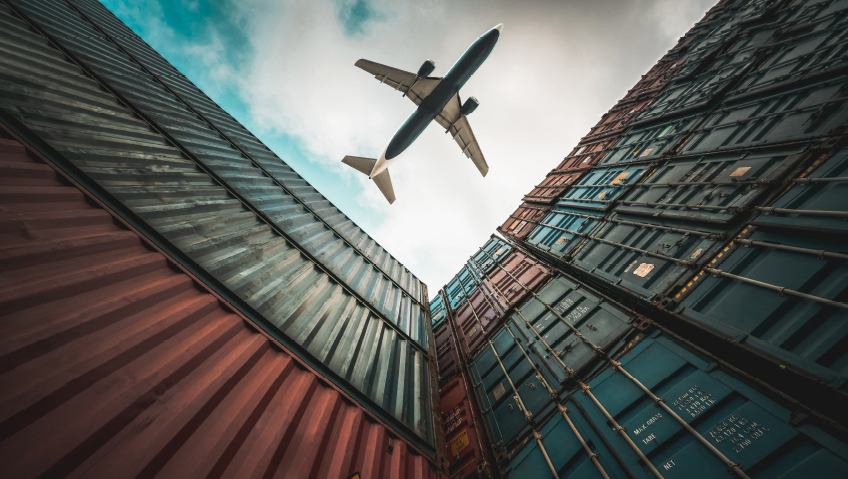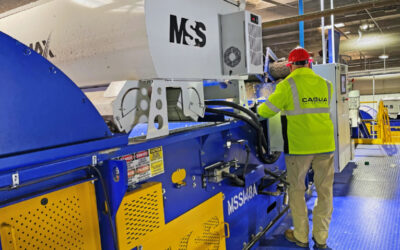We live in a world where technology is growing and changing so rapidly that all of our electronics are becoming disposable at almost the same rate. But what happens to all that electronic waste? That’s where eCycle Solutions comes in.
~
You’ve got your blue box for recycling your food packaging, pop cans and office supplies. But when your aging laptop or printer finally packs it in, you pitch it to the curb for pickup on garbage day.
The problem is, electronic waste, or e-waste, is some of the most toxic and hazardous to the environment – and it’s filling up our landfills with some serious consequences. Lead, mercury, cadmium, fire-retardant chemicals, and arsenic seep into the ground and groundwater. With new generations of cell phones, tablets and laptops released every year, the demand for the latest technology is creating a fast churn, and the volume of disposables shows no signs of slowing down.
That’s why recycling electronics is an essential and growing industry. Enter eCycle Solutions, a Canadian company headquartered in Mississauga, Ontario, that separates the still-usable parts (there are quite a few of these) and safely disposes of the hazardous chemicals.
“Most people look at electronic equipment or electronics in general and don’t really think about the after effects or the end-of-life on it,” says Michael Collins, eCycle’s President and CEO.
“Initially, it’s that shiny new thing that’s going to make your job easier. But they don’t really stop to think about what happens at the end of it and all the peripherals that come with it, like monitors or that mouse you have on your desk, and the wires that attach them all together. We are in a position where we can sit down and actually break it down for people, as to ‘hey you know what, this phone, there’s nothing in this phone that cannot be recycled.’ Our team of experts will break that down and ensure each part is properly recycled.”
Managing e-waste is not just about removing sensitive data from electronics for customer protection, though that’s certainly a part of the process. It’s a full triage to take out harmful batteries, mercury, toner, ink and leaded glass to be audited and approved by the company’s processing partners while being compliant with the government and industry established regulations.
Useable components – aftermarket parts – are sold in bulk to distributors for resale. Steel, precious metals and plastics are separated out as well and sent to a smelter. The plastics, for example, are sent to Malaysia to be melted and extruded into pellets to be used for manufacturing new products. This process keeps plastics – which can take 500 years or more to break down – out of landfills.
“You hear a lot today around plastics,” Collins says. “Plastic straws are getting a rough go of it. And really the plastic straw is not the big issue, but it’s a great thing to latch onto and needs to be banned, but it’s about packaging and wrap and single-use plastics that are out of control. And as a race, globally, we don’t have an alternative solution to those challenges yet, but we are working on them.”
So what eCycle does for individuals and businesses across Canada is all part of doing something good for the planet and what’s known as the “circular economy,” a sustainable regenerative system whereby resource input and waste are minimized with long-lasting design, repair, reuse and remanufacturing processes.
“These are used pieces of electronic equipment, but they still have life,” explains Collins. “It may not be what a business, corporation or even an individual would need for their own personal and business needs, but they fit the category for someone who has fewer requirements from an electronics point of view. So, you will see a lot of these going into schools,” for example.
And that kind of mission is nice to come to work to every day – and what Collins says his teams thrive on.
“You know, it’s a good thing, and I think that there are special people in this industry, with that like-mind, who want to do good. At the end of the day it’s a business, but we are looking at innovative ways to do the right thing for the environment. While we are doing what’s right for the circular economy, we are doing the right things for, in my case, my grandchildren and their children. It’s a big part of our culture and I’m always looking at how we can find the next innovative way to improve and do more.”
eCycle has been in business since 2005, applauded in that time for its many green initiatives, awareness campaigns and partnerships with provincial stewardship programs – as well as with private partners like Best Buy and Staples – across the country to collect and control electronics recycling. Each province has unique protocols, with British Columbia being the most progressive, Collins explains. “They view electronics as anything that has a plug or a battery. So that could include the last little race car that Jimmy got for Christmas. But he just got a new one, so the old one could go into a stewardship program in B.C., but that can’t go into any other stewardship program in the country, and may end up in a landfill site.”
Collins has been at the helm of eCycle for less than a year, but brings a wealth of executive leadership experience to the role, including experience with Shred-It, a paper shredding and media destruction company where Collins ran the U.K. and Ireland operations. “Now I’ve got experience in managing the recycling of hazardous electronic waste while protecting businesses’ and people’s sensitive information while helping the environment,” he says.
One of the biggest challenges faced in the industry is lithium ion batteries. And every mobile device contains not just one but multiple lithium ion batteries. They are a fire hazard and are explosive in a steel shredder, and just about everyone in the industry has experienced a fire that takes more than just a fire extinguisher to put out. eCycle brought in new fire suppression systems as well as quality checks in the teardown lines to make sure the chemicals can be safely managed and sent for recycling. These added safety measures have helped eliminate incidents for the company’s hardworking staff of about 500 at peak times in four locations.
The new shred line in Mississauga is unique to the Canadian market, and eCycle worked closely with a number of engineering firms to make sure that it’s producing the proper outputs to manage steel, precious metals and plastics that come off the line and get separated. The team is excited to be relaunching and having a grand opening in the near future.
eCycle is also working with one of Canada’s more innovative organisations on an AI project for robotic arms to separate materials. One of the biggest aspects of the industry is taking things apart, so health and safety is a top priority. These robotic arms will manage some of the risk involved. It’s not about reducing labour; it’s about safety and increasing mass in a growth industry where eCycle expects to quadruple the volume of material it processes as stewardship programs expand and the circular economy becomes more a way of life for businesses.
“Essentially we are mining above ground,” Collins says, “to get back what that iPhone, that laptop, that tablet have in them. You take out the gold, the silver, the palladium that’s used to make electronic devices and you recycle that back into the economy.”













